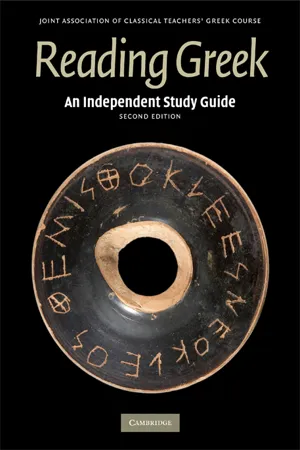About this book
First published in 1978 and now thoroughly revised, Reading Greek is a best-selling one-year introductory course in ancient Greek for students of any age. It combines the best of modern and traditional language-learning techniques and is used in schools, summer schools and universities across the world. This Independent Study Guide is intended to help students who are learning Greek on their own or with only limited access to a teacher. It contains notes on the texts that appear in the Text and Vocabulary volume, translations of all the texts, answers to the exercises in the Grammar and Exercises volume and cross-references to the relevant fifth-century background in The World of Athens. There are instructions of how to use the course and the Study Guide. The book will also be useful to students in schools, universities and summer schools who have to learn Greek rapidly.
Frequently asked questions
- Essential is ideal for learners and professionals who enjoy exploring a wide range of subjects. Access the Essential Library with 800,000+ trusted titles and best-sellers across business, personal growth, and the humanities. Includes unlimited reading time and Standard Read Aloud voice.
- Complete: Perfect for advanced learners and researchers needing full, unrestricted access. Unlock 1.4M+ books across hundreds of subjects, including academic and specialized titles. The Complete Plan also includes advanced features like Premium Read Aloud and Research Assistant.
Please note we cannot support devices running on iOS 13 and Android 7 or earlier. Learn more about using the app.
Information
Table of contents
- Cover
- Half-title
- Title
- Copyright
- Contents
- Authors’ note
- Author’s note on the revised edition
- Preface
- Abbreviations used in the text
- Grammatical Introduction
- Section One: The insurance scam
- Section Two: The glorious past
- Section Three: Athens and Sparta
- Section Four: Lawlessness in Athenian life
- Section Five: ‘Socrates corrupts the young’
- Section Six
- Section Seven: Socrates and intellectual inquiry
- Section Eight: Aristophanes’ Birds
- Section Nine: Aristophanes’ Wasps
- Section Ten: Aristophanes’ Lysistrata
- Section Eleven: Aristophanes’ Akharnians
- Sections Twelve–Fourteen: The prosecution of Neaira
- Section Twelve: Neaira as slave
- Section Thirteen: Neaira as married woman
- Section Fourteen: Guarding a woman’s purity
- Section Fifteen: Alkestis in Euripides’ play
- Section Sixteen: Offi cial justice – ships, state and individuals
- Section Seventeen: Private justice – trouble down at the farm
- Section Eighteen: How Zeus gave justice to men
- Section Nineteen: The story of Adrastos
- Section Twenty: Odysseus and Nausikaa
